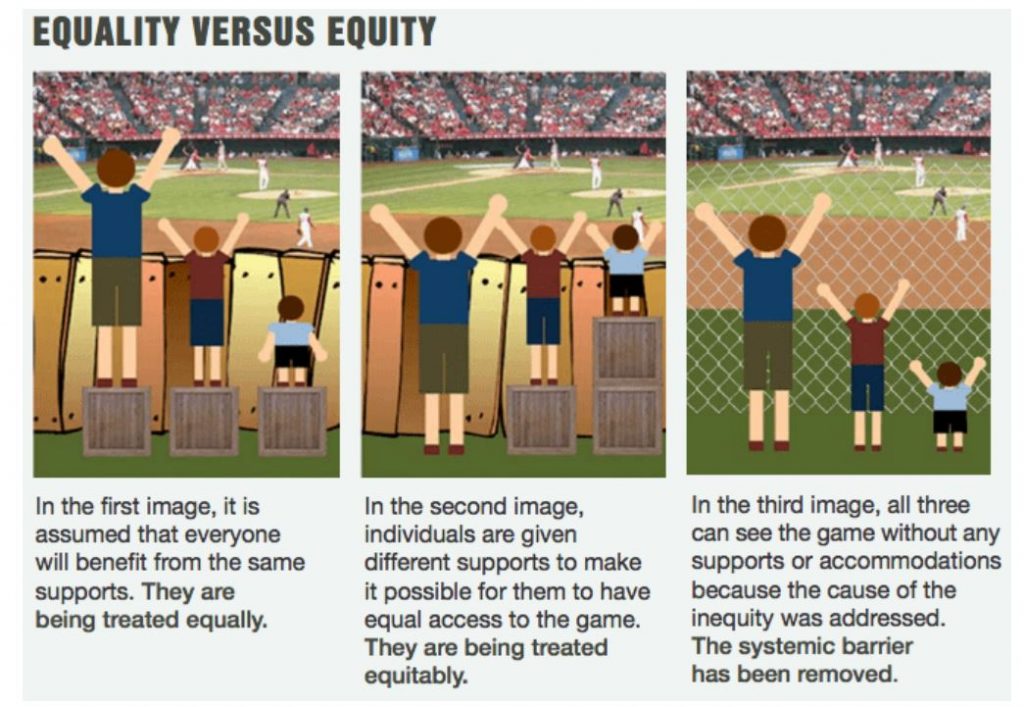We want you to get excited about inclusive practices and the value of universal design!
This SSRHC insight video highlights what UDL advocates for — the idea that traditional models of education does not effectively meet the needs of all learners. When we aim for the ‘standard learner’, someone will always be left out!
You Say Inclusive, I Say Universal
Universal Design for Learning (UDL) is a theory and framework that intentionally plans for all learners by embracing the idea that individual learners arrive to any learning space with variant preferences, needs, and capabilities (Rose, 2012). It was developed in the 1980s at the Centre for Applied Special Technology. As a viable theory for encouraging and measuring learning, it undergone updates and development over the past several decades, culminating in a framework that encourages multiple means of engagement, representation, and action and expression in a learning environment (CAST, n.d.).

As the image and captions above illustrate, barrier free access to the built and intellectual environment doesn’t just help those who need accommodations, it creates a more inclusive and immersive environment for all! Beyond serving as a model to reach students who are managing specific access barriers to education because of the vulnerabilities they may face, UDL challenges traditional approaches to education and learning by proposing a revolutionary idea–that all learners benefit from a more accessible learning environment (Meyers, Rose & Gordon, 2014). This an achievable goal that binds our shared intellectual community, and underpins our discussions in Week 8.
- CAST. (n.d.). CAST Timeline. Retrieved from Link to CAST
- Meyer, A., Rose, D. & Gordon, D. (2014). Universal Design for Learning: Theory and Practice. Retrieved from LINK
- Rose, T. (2012). Todd Rose: Variability Matters. Retrieved from LINK

Universal Design for Learning illustrates that learning happens across affective, recognition, and strategic networks. Source: CAST. (n.d.) Universal Design for Learning Guidelines. Retrieved from LINK
Spotlight on Inclusive Practice: UDL for Beginners
As we will learn in Week 8, Universal Design for Learning isn’t just a theory, it is a compilation of sign posts and practices that advance the idea that planning for multiple means of representation, action, and engagement makes our learning environments more inclusive.
There isn’t one right or wrong way to implement UDL, but there is a broader need for UDL when considering the ways in which it can support an educational environment underpinned by a duty to accommodate. One of the central goals of the Accessibility for Ontarians with a Disability Act (AODA) is a barrier free society. Universal Design for Learning supports this mandate in several ways, including the goal of removing barriers for communication and improving access to assistive technology as a standard of the learning environment, rather than an add-on. In this way, both the AODA and UDL are aligned in the idea that a barrier-free society is essential for some, but good for all!
New to UDL and want to learn more? Access these essential resources for additional information from the Center for Applied Special Technology:
CAST. (n.d.). Provide Multiple Means of Engagement. Retrieved from http://udlguidelines.cast.org/engagement
CAST. (n.d.). Provide Multiple Means of Action and Expression. Retrieved from http://udlguidelines.cast.org/action-expression
CAST. (n.d.) Provide Multiple Means of Representation. Retrieved from http://udlguidelines.cast.org/representation
Teaching & Learning Sessions: A Sneak Peak
Join us in Week 8 to learn about the challenges and promises of inclusive and culturally responsive pedagogy! In doing so you will also get to hear from experts in inclusive learning environments, including insights from:
Our UDL keynote speaker, Dr. Kate Synder, who will be introduced by our VPAE, Dr. Stephanie Dimech. Dr. Snyder is Director of the Centre for Teaching and Learning at Nova Scotia Community College where she works with faculty, staff, and administration to support a culture of teaching and learning grounded in equity, excellent, and innovation. Dr. Snyder has dedicated her career to supporting students and their learning across education systems. Learn more about Dr. Synder’s research and area of expertise here: LINK
Dr. Barbara Roberts, who will speak on our Student Experience Panel alongside Fleming students. Dr. Roberts recently retired as Executive Director of the WorkLife Office and Senior Advisor to the Provost for WorkLife at Michigan State University, where she also held an adjunct faculty appointment in the College of Education. Dr. Roberts’ expertise is in how individuals participate successfully in education environments, facilitating a climate where all individuals are respected and supported in their work and personal lives. Her work focuses on how structures include or exclude people with disabilities, and the impact of policy and practice on inclusion. Dr. Roberts consults with colleges and universities across Canada on inclusion and accommodation. Watch Dr. Roberts give a presentation on inclusive practice here: Accommodation vs. Accessibility: A Pro-active Approach by Barbara Roberts
Stephanie Moeser, an expert who works with youth and young adults with mood disorders, anxiety, and ADHD, will also participate in our Student Experience Panel. Stephanie is a registered social worker with a Bachelor of Social Work from Ryerson University and a Masters of Social Work from University of Toronto. Stephanie has a specialization in working with children, youth, and adults with Autism Spectrum Disorder and co-ocurring mental health concerns. She has worked in both clinical and management positions at Geneva Centre for Autism and managed a dual-diagnosis program at COTA Health in Toronto. You can access Stephanie’s website here: Link
- A panel that explores the challenges and opportunities of the return to more on-campus instruction
- Sessions that focus on universal design, inclusive pedagogy, and technology enhanced learning
- A faculty showcase that will highlight the innovative work of Fleming faculty members
- Opportunities for social connection, networking, and reflective practice
We’d like to hear from you!
The Teaching Hub is a monthly collection of things educators at Fleming College might like to know about, doled out in small chunks, curated by the Learning Design & Support Team.
We welcome ideas, feedback, and teaching & learning content suggestions here: LDSTeam@flemingcollege.ca
